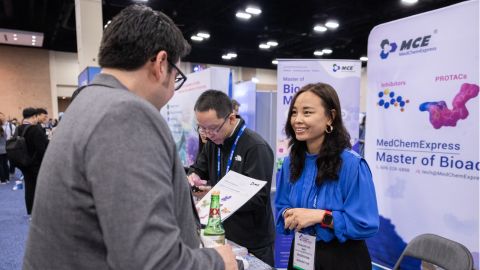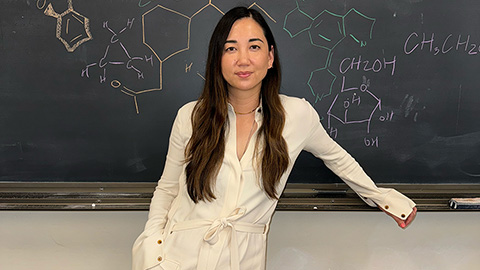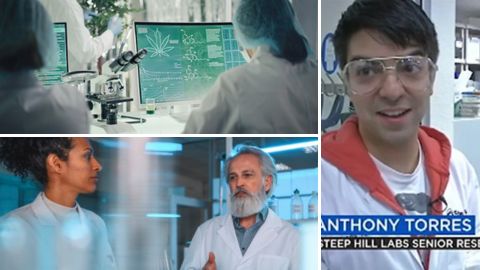“Besides getting sweat on me at times, I have enjoyed the experience”
Shyretha Brown had an academic postdoc lined up prior to attending Experimental Biology 2017. In the EB exhibit hall, she came across a postdoc opportunity at the Gatorade Sports Science Institute and learned that it takes a lot of physiology research to make a good workout recovery drink. Now a senior scientist at PepsiCo, Brown works on products like a wearable sweat sensor that gives athletes personalized hydration instructions. Reached by phone, Brown told ASBMB Today about her career path and her educational outreach. This interview has been condensed.

Name: Shyretha Brown
Current position: Senior scientist, PepsiCo
Degree: Ph.D., biological sciences, Tennessee State University, 2017
Postdoc: Gatorade Sports Science Institute
Favorite protein: Interleukin-6
What did you study in graduate school?
I studied how environmental contaminants, such as butyltins, affect immune cell function — specifically interleukins IL-1β and IL-6. I didn't know that my graduate school work could be applied to industry. Now that I think back on it, I wish that more opportunities related to science and how applicable it is to industry had been discussed in grad school.
What did a normal day look like for you pre-COVID-19?
I conduct human clinical trials with athletes. On a normal day, I would monitor the athlete during a stationary bike ride or treadmill run, collect sweat samples and analyze those samples in our biochemistry lab. Besides getting sweat on me at times, I have enjoyed the experience.
My normal day without scrubs involved paperwork around those trials. I also work on a few innovation and education related projects.
You also founded an education nonprofit?
I founded a nonprofit called Building Bridges Inc. to expose, equip and empower young girls to pursue STEM through self-awareness education. The main goal is to fill in gaps by building bridges that will empower young girls to embrace creative thinking and endless possibilities. Our most popular program pre–COVID-19 was "The Science Behind Hair." Students learned the hair growth cycle and then made their own conditioner and shampoo.
Why is education important to you?
Growing up, my mind was first set on becoming a nurse, then a medical doctor. Those things didn't happen. It was through education that I got exposed to research in undergrad, which led to other opportunities. Opportunity after opportunity has exposed me to what else is out there that I didn't know about previously. If you don't know, you just don't know!
I'm very passionate about mentoring and exposing youth to different opportunities so they can spend less time jumping the hurdles. If I can be a stepping stone to help someone get there quicker than I did, then I'm OK with that.
Any advice you wish you'd gotten?
Enjoy the ride; however, know the destination. Meaning set the pace and enjoy the journey, but know exactly what you're trying to accomplish.
(This story was updated Jan. 7, 2021 to correct Brown’s graduation date and remove an erroneous reference to Johnson & Johnson.)
Would you like to suggest an ASBMB member who works in industry for a Five Questions interview? Send an email to ASBMB Today.
Enjoy reading ASBMB Today?
Become a member to receive the print edition four times a year and the digital edition monthly.
Learn moreFeatured jobs
from the ASBMB career center
Get the latest from ASBMB Today
Enter your email address, and we’ll send you a weekly email with recent articles, interviews and more.
Latest in Industry
Industry highlights or most popular articles

Black excellence in biotech: Shaping the future of an industry
This Black History Month, we highlight the impact of DEI initiatives, trailblazing scientists and industry leaders working to create a more inclusive and scientific community. Discover how you can be part of the movement.

Attend ASBMB’s career and education fair
Attending the ASBMB career and education fair is a great way to explore new opportunities, make valuable connections and gain insights into potential career paths.

Benefits of attending a large scientific conference
Researchers have a lot of choices when it comes to conferences and symposia. A large conference like the ASBMB Annual Meeting offers myriad opportunities, such as poster sessions, top research talks, social events, workshops, vendor booths and more.

Biotech startup worms its way into therapeutics
Andrea Choe's company, Holoclara, has created an anti-inflammatory drug based on a molecule from worms.

How military forensic scientists use DNA to solve mysteries
Learn how two analysts at the Armed Forces DNA Identification Laboratory use molecular biology and genetics to identify the remains of fallen troops.

Careers in industry: A year in review
Careers columnist Inayah Entzminger looks back at 12 months of interviews, advice and lists of resources.

